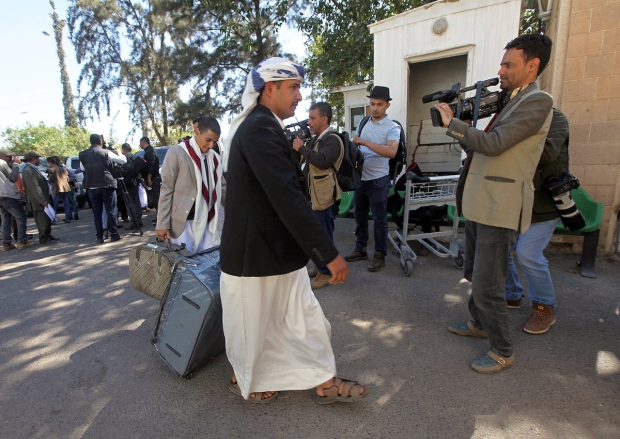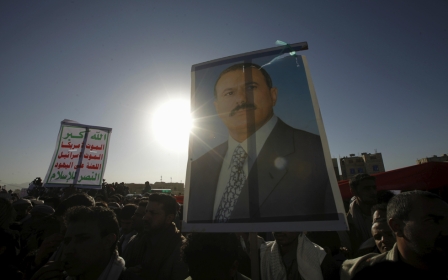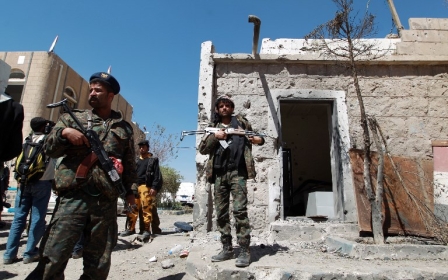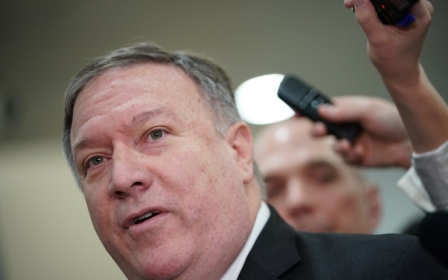Yemen's Houthi rebels land in Sweden for UN-brokered peace talks
A delegation of Houthi rebels has arrived in Sweden alongside the UN envoy to Yemen, Martin Griffiths, who has spearheaded a recent international push to bring the country's warring sides to the negotiating table.
The Houthi delegation arrived in Sweden for the peace talks late on Tuesday, the UN said, as reported by AFP.
Officials representing Yemen's Saudi-backed government, headed by ousted President Abd Rabbuh Mansour Hadi, are due to arrive on Wednesday, the news agency said.
"Griffiths was true to his word ... We are certain he has put in place a general framework for negotiations in order to proceed with the political process," Abdelmeguid Hanash, a member of the Houthi team, told reporters before boarding a Kuwaiti plane that took off from Yemen's capital, Sanaa, for Sweden.
The UN has actively sought to get the warring parties together for peace negotiations to bring an end to the devastating conflict and this would be the first peace talks since 2016.
A Saudi-led coalition began a military operation in Yemen in 2015 to push back the Houthis and restore Hadi to power.
The country has since been pulled into a worsening humanitarian crisis, with as many as 14 million people currently on the verge of famine, the UN recently warned.
UAE Minister of State for Foreign Affairs Anwar Gargash said on Tuesday that the Sweden talks, set to be held in a renovated castle outside Stockholm, are a "critical opportunity".
"A sustainable Yemeni-led political solution offers the best chance to ending the current crisis. A stable state, important for the region, cannot coexist with unlawful militias," Gargash said.
This week, the UN has successfully brokered several confidence-building measures to ensure that representatives for the Houthis and Yemen's Saudi-backed government make it to Sweden.
On Monday, about 50 wounded Houthi rebels were evacuated from the Yemeni capital, Sanaa, and flown to Oman to receive treatment.
The Houthis and the Yemeni government also agreed earlier in the day on Tuesday to exchange hundreds of prisoners that have been captured by each of the opposing sides since the war began.
The deal covers between 1,500 and 2,000 members of the pro-government forces and between 1,000 and 1,500 rebels, government official Hadi Haig said.
Talks could begin on Thursday
The last attempt to hold Yemen peace talks failed in September after the Houthi delegation didn't show up. The rebel group had wanted guarantees its fighters would be able to leave and return to Yemen safely, among other demands.
Griffiths, the UN envoy, hopes to reach a deal on reopening Sanaa airport, implementing the prisoner swap and agreeing to a detente in the critical Yemeni port city of Hodeidah, which could serve as a foundation for a wider ceasefire.
Residents in Hodeidah were fearful of renewed fighting if the peace talks failed. "The situation here does not make us optimistic that we will avoid war," Mohammed Taher, a 51-year-old government employee, told Reuters.
Although no date has been announced for the start of the negotiations, Yemeni government sources told AFP the talks could begin on Thursday.
The United States welcomed the prospect of peace talks on Tuesday, less than a week after US senators moved forward with a historic resolution to halt Washington's support for the Saudi-led coalition fighting in Yemen.
Heather Nauert, spokeswoman for the US State Department, said the US "calls on parties to engage fully and genuinely, and cease any ongoing hostilities".
"We have no illusions that this process will be easy, but we welcome this necessary and vital first step," she said in a statement.
However, Nauert's boss, US Secretary of State Mike Pompeo, said over the weekend that the US intends to continue to support Saudi-led forces in Yemen, despite calls both in the US and abroad to pressure Riyadh to end the war.
"The programme that we're involved in today we intend to continue," Pompeo told CNN on Saturday.
New MEE newsletter: Jerusalem Dispatch
Sign up to get the latest insights and analysis on Israel-Palestine, alongside Turkey Unpacked and other MEE newsletters
Middle East Eye delivers independent and unrivalled coverage and analysis of the Middle East, North Africa and beyond. To learn more about republishing this content and the associated fees, please fill out this form. More about MEE can be found here.





